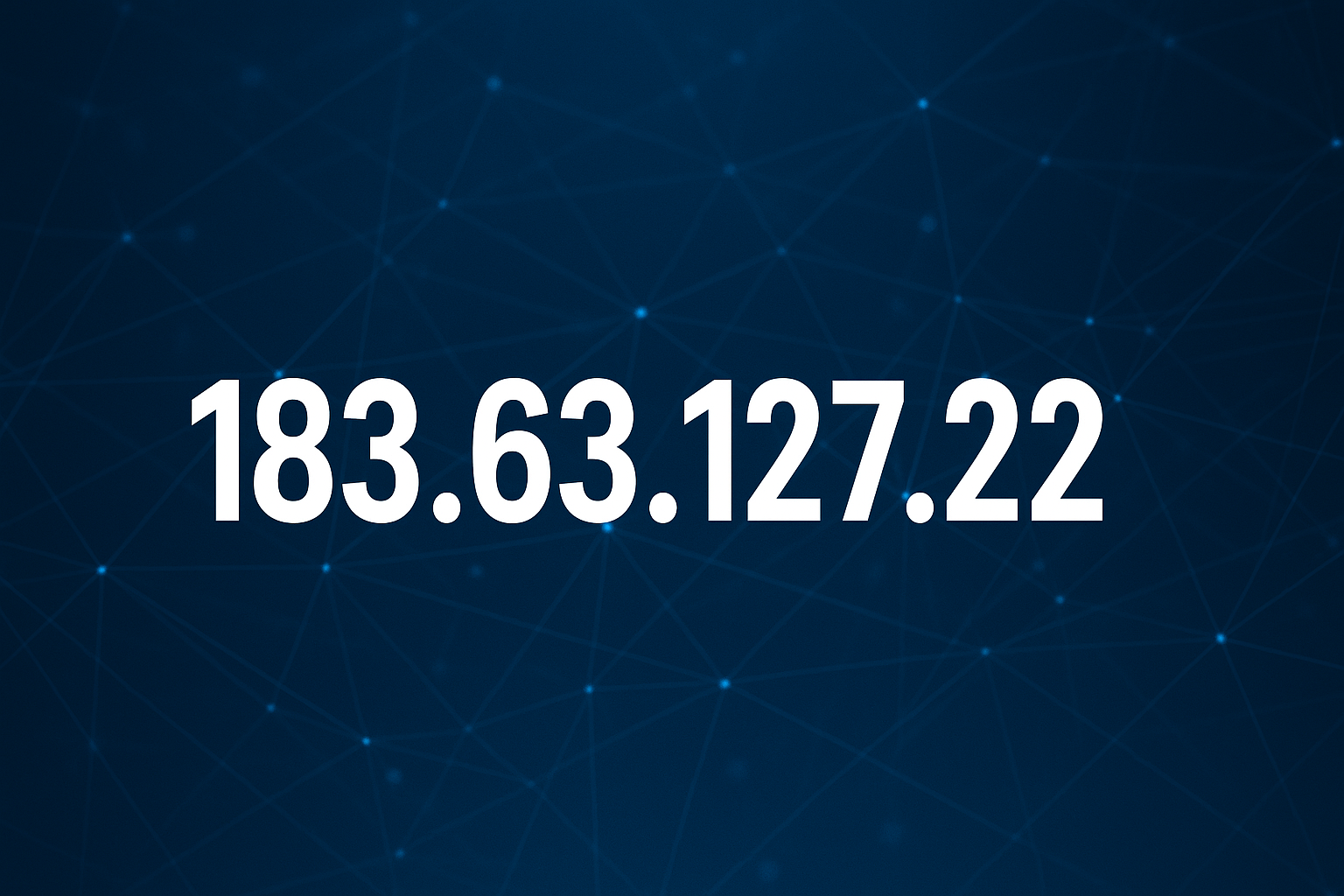In today’s interconnected digital world, IP addresses play a central role in how information is transmitted and received across networks. One such IP address that may appear in system logs, cybersecurity reports, or internet monitoring tools is 183.63.127.22. Whether you are an IT professional, a website administrator, or simply someone interested in understanding how the internet works, learning more about IP addresses like 183.63.127.22 can be very useful.
This article explores the nature of 183.63.127.22, its potential uses, how to analyze it, and why monitoring such IP addresses is essential for network security and digital efficiency.
What is 183.63.127.22?
An IP address is a unique identifier assigned to each device or network connected to the internet. 183.63.127.22 is an example of an IPv4 address, which is the most common and widely used version of the Internet Protocol. IPv4 addresses consist of four sets of numbers separated by dots, and each number ranges from 0 to 255.
In this case, 183.63.127.22 can represent a device, a network gateway, or even a proxy server. Its purpose is to enable communication between devices, allowing data to flow from one point to another on the internet. Without IP addresses, online services like browsing, emailing, and cloud storage would not be possible.
IPv4 and the Role of 183.63.127.22
The format of 183.63.127.22 clearly shows it belongs to the IPv4 category. IPv4 has been in use since the early days of the internet, and despite the introduction of IPv6, it remains the backbone of most digital communication.
IPv4 addresses like 183.63.127.22 are structured into network and host portions. This structure allows internet service providers (ISPs) to assign and manage addresses, ensuring efficient traffic routing.
While IPv6 is slowly gaining traction due to the shortage of IPv4 addresses, IPs like 183.63.127.22 are still highly relevant and widely in use.
Why 183.63.127.22 Appears in Network Logs
If you are analyzing your server or firewall logs, you may notice traffic originating from or directed to 183.63.127.22. There are several reasons why this address might appear:
-
Legitimate User Activity – It could simply represent a normal user browsing your website.
-
Automated Bots – Search engines and other automated tools often send requests from multiple IP addresses.
-
Security Probes – Some IPs are linked to scanning tools that check for open ports or vulnerabilities.
-
Background Internet Traffic – Random, harmless requests are common across the internet.
Understanding the context of 183.63.127.22 in your logs is key to deciding whether it poses a threat or not.
Geolocation and 183.63.127.22
One of the most common reasons people search for an IP address like 183.63.127.22 is to determine its origin. Through IP lookup tools, it is possible to identify approximate geographic locations, including:
-
Country
-
Region or city
-
Internet Service Provider (ISP)
-
Time zone
However, it is important to note that geolocation is not always 100% accurate. While an IP like 183.63.127.22 can give an idea of where traffic originates, it cannot pinpoint exact addresses or individual users without cooperation from the ISP.
Security Considerations with 183.63.127.22
For cybersecurity experts, IP addresses are critical pieces of information. If 183.63.127.22 appears frequently in suspicious activity logs, it may be linked to potential threats such as:
-
Brute-force login attempts
-
Distributed denial-of-service (DDoS) attacks
-
Spam or phishing activities
-
Unauthorized access attempts
To ensure network safety, IT administrators should cross-check IP addresses like 183.63.127.22 with global threat intelligence databases. These services maintain updated records of malicious IP addresses, helping organizations detect and block harmful traffic.
How to Check the Reputation of 183.63.127.22
If you encounter 183.63.127.22 in your logs and want to verify its legitimacy, there are multiple steps you can take:
-
Use an IP Lookup Tool – Online tools provide details such as ISP, location, and blacklist status.
-
Check DNS Records – Reverse DNS lookups may reveal the domain associated with the IP.
-
Consult Threat Databases – Platforms like AbuseIPDB or VirusTotal list reports of malicious activity.
-
Monitor Traffic Patterns – Look for unusual request spikes from the same IP address.
By combining these methods, you can decide whether to allow, monitor, or block traffic from 183.63.127.22.
Best Practices for Handling IPs Like 183.63.127.22
When dealing with any IP address that interacts with your network, it’s important to adopt proactive practices. Here are some steps that apply to 183.63.127.22:
-
Log Every Interaction: Maintain records of access attempts for auditing and troubleshooting.
-
Set Firewall Rules: Block repeated malicious attempts from the same IP.
-
Update Systems Regularly: Ensure your software and plugins are patched to prevent exploitation.
-
Deploy Intrusion Detection Systems (IDS): Automate monitoring for suspicious IPs.
-
Educate Teams: Make sure your IT team knows how to analyze and respond to unusual traffic.
Common Misconceptions About 183.63.127.22
When people come across IPs like 183.63.127.22, they often make assumptions. Let’s clear up a few common misconceptions:
-
Myth 1: Every unfamiliar IP is malicious.
Not all unknown IPs are harmful. Many are legitimate visitors or automated crawlers. -
Myth 2: Geolocation gives exact addresses.
IP lookups only provide an approximate area, not precise personal locations. -
Myth 3: Blocking one IP solves the problem.
Attackers often use multiple IPs. Blocking a single one like 183.63.127.22 is only a temporary measure. -
Myth 4: IP addresses never change.
Many ISPs assign dynamic IPs, meaning addresses like 183.63.127.22 may be reassigned to different users over time.
The Future of IP Addresses Beyond 183.63.127.22
As the demand for connected devices continues to grow, IPv6 adoption will increase. However, IPv4 addresses like 183.63.127.22 will remain relevant for years, especially in regions where IPv6 is not yet fully deployed.
Businesses and individuals must be prepared to handle both IPv4 and IPv6 traffic while maintaining strong security practices. This means that analyzing addresses like 183.63.127.22 will remain a valuable skill for IT professionals well into the future.
Read also: Can Kolltadihydo Be Cured? A Complete Guide to Understanding, Treatment, and Hope
Conclusion
The IP address 183.63.127.22 may seem like just a string of numbers, but it represents a key part of how the internet functions. Whether it appears in your server logs, a cybersecurity report, or during online research, understanding how to interpret and analyze such IPs is crucial.
By learning about 183.63.127.22, you gain insights into networking, geolocation, security, and digital communication. With proper monitoring and best practices, addresses like this can be managed effectively, helping ensure safer and more efficient online experiences.



